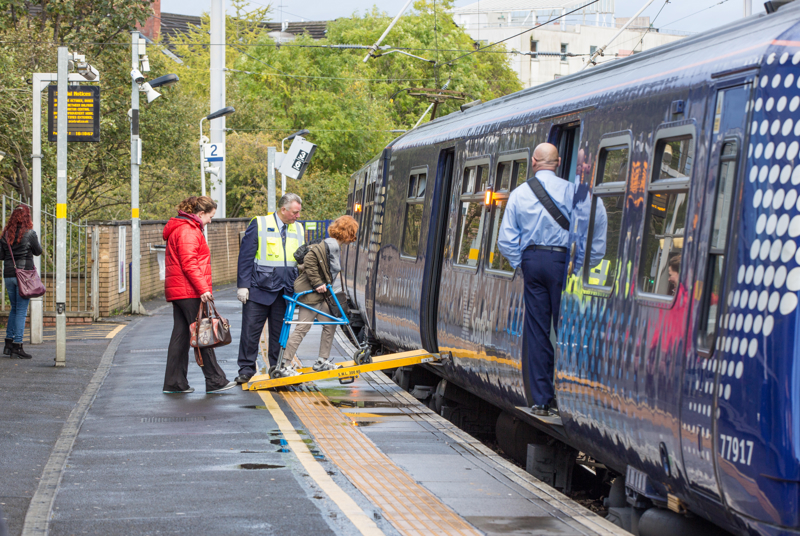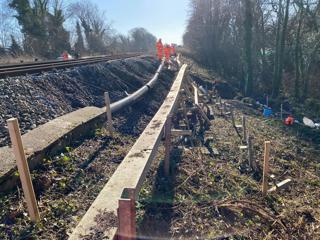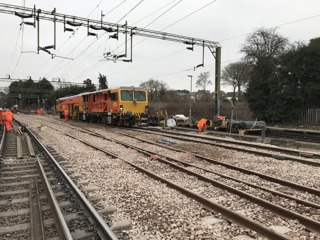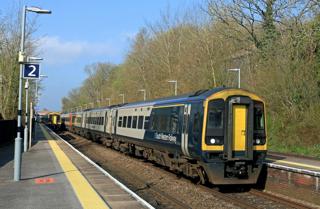
The Department for Transport has branded suggestions that it is downgrading commitments to accessibility as “simply incorrect”.

The Department for Transport has branded suggestions that it is downgrading commitments to accessibility as “simply incorrect”.
The comment came in response to a House of Commons Transport Select Committee (TSC) report published on March 20 about accessibility on public transport (Access denied: rights versus reality in disabled people’s access to transport), and after TSC Chair Ruth Cadbury wrote to Rail Minister Lord Hendy asking for clarification on part of the rail reform consultation relating to accessibility.
The report said a new inclusive transport strategy was needed within 12 months.
Speaking to RAIL, Cadbury said there had been progress in improving accessibility, but that “since COVID, it feels to some extent things are not progressing the way they were”, highlighting issues such as the Access for All programme (RAIL 1031).
The report found that around 65% of 825 people surveyed had faced difficulty on trains - either always, most of the time, or often. That figure increased to nearly 85% when including those who answered “occasionally”.
It said the burden on individuals to hold operators and authorities to account was “too great” and included numerous quotes from respondents who detailed missing meetings, having to crawl off trains, or experiencing poor treatment from staff.
Cadbury said the onus should be on providers to ensure staff are on hand.
She added: “On a monthly basis, people decide not to travel. It’s not worth the hassle.”
TSC described the Access for All funding through competitive bidding as a “piecemeal approach arguably at odds with a culture of accessibility for all”.
MPs want the government to commit to setting out a road map within 12 months that details how it will meet its timescales for achieving independent accessibility across the rail network.
“This road map must inform the rolling stock, station and network enhancements strategies of the Department and, when it is operational, Great British Railways,” the report said. Referring to Passenger Assist
services, MPs described the performance as “patchy”. The most recent Office of Rail and Road report into Passenger Assist performance and satisfaction (2023-24) showed an overall drop from 91% to 87%, with the proportion of users saying they had received all the assistance they booked decreasing from 81% to 76%.

The report said there was universal acknowledgment that more needed to be done, and that there were “too many unacceptable failures”.
Operators’ representatives and sector bodies also “tended to be positive about the trajectory of their sector’s accessibility performance, and confident for the future, noting the work they have undertaken to improve their performance and corporate understanding”.
However, disabled users told MPs they felt there was a lack of cultural leadership and understanding in the rail industry, with TSC wanting the government to collect comprehensive data on not meeting accessibility obligations, similar to the aviation industry.
Examples of good and poor support were highlighted. The report praised “sensory nooks” in passenger assistance lounges at Manchester Piccadilly, and Lumo’s tunnel guide, but described these as “isolated good practice”.
The Rail Delivery Group (RDG), representing train operators, told RAIL it continues to work with operators to drive consistency, with members of its executive team participating in the Travelling in Our Shoes programme alongside passengers with additional needs.
“Feedback from this initiative has been invaluable,” a spokesperson said. RDG also highlighted a single overarching National Autism Rail Friendly Travel Guide to replace various versions in use across the network.
However, Cadbury, who also said new trains “shouldn’t be commissioned” if they don’t have level boarding, cited the example to RAIL of one woman who needs help navigating large stations.
“The help points are inside the station. If it was at the entrance, it would transform her confidence. There are many, many little things which could make a huge difference,” she explained.
She said she hoped the creation of GBR to run all passenger services (except open access) would lead to better consistency, adding: “One of the benefits of GBR is you have a single system and single provider.”
RDG said that while improvements to Passenger Assist have led to more people using it, challenges remain. A spokesman said the next phase will focus on greater personalisation and improved service efficiency.
Local Transport Minister Simon Lightwood said accessibility had “been an afterthought in developing transport services, and there is more to do to ensure everyone can travel easily and with dignity”. He said the government would consider the report’s recommendations.
Days before the report was published, Cadbury wrote to Lord Hendy about rail reform consultation.
She said TSC wanted to know if statutory duties on consideration for accessibility (along with freight, environment and wider benefits of the railway) will form part of GBR’s licence - something that was in February 2024’s draft Rail Reform Bill, but absent from the new consultation document.
“If not, we would be keen to hear whether the government has in mind other mechanisms for ensuring that Great British Railways (GBR) promotes these specific ends,” she wrote.
Responding to the letter, a DfT spokesperson said: “Any suggestion we are downgrading our existing commitments to accessibility, freight, and the environment is simply incorrect.
“We are committed to delivering a rail system that truly serves its customers and acts as an engine for growth.”
The DfT has said accessibility will be central to GBR, with the Public Sector Equality Duty applying to it. It is also consulting on whether the passenger watchdog should set minimum standards in passenger accessibility
Login to continue reading
Or register with RAIL to keep up-to-date with the latest news, insight and opinion.


















Login to comment
Comments
No comments have been made yet.